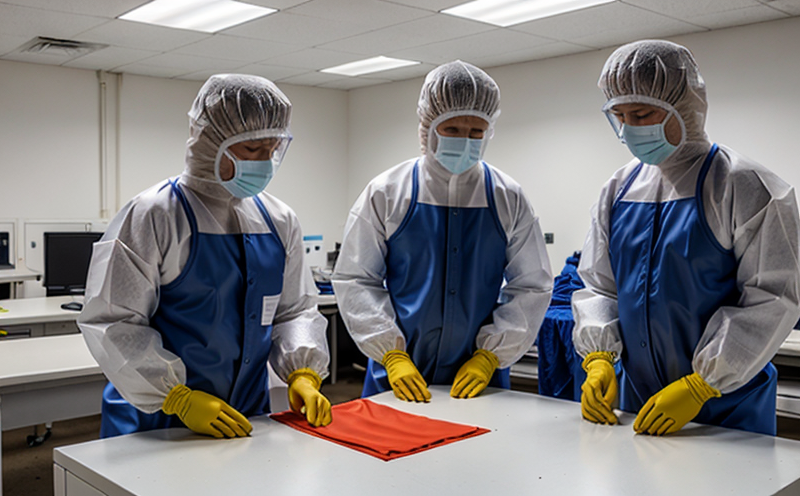ANSI/ISEA 201 Respiratory Protective Clothing Compatibility Testing
The ANSI/ISEA 201 standard provides a framework to ensure that respiratory protective clothing is compatible and can be used safely with various respirators. This service ensures the proper fit, function, and safety of workers who wear such protective equipment in hazardous environments.
Respiratory protective clothing must not only protect against chemical, biological, or physical hazards but also allow for efficient breathing without compromising the wearer's health. Compatibility testing is crucial to ensure that no issues arise from interactions between the garment and respirators during use.
This service aims at verifying that the respiratory protective equipment can be worn simultaneously with other personal protective equipment (PPE) such as gloves, safety glasses, helmets, or respirators without causing discomfort, interference in movement, or compromising the integrity of either piece. The testing process is designed to ensure that there are no gaps or overlaps that could lead to breaches in protection.
The standard covers a wide range of protective clothing types and respirator devices. Testing can be conducted on full-body suits, coveralls, aprons, hoods, gloves, and other items specifically designed for respiratory safety.
Testing typically involves several steps including visual inspections, fit testing, and functional assessments. Visual inspections check the physical condition and appearance of both the protective clothing and respirator. Fit testing ensures that the equipment fits properly around the neck area where the respirator interface is located. Functional assessments verify the performance characteristics such as breathability, comfort, and durability.
During the fit test, it's essential to ensure that there are no obstructions or gaps between the respiratory protective clothing and any other pieces of PPE. This includes ensuring that the straps of a respirator do not interfere with the closure mechanisms on the garment. For instance, if an employee is wearing a full-face respirator, the chin strap should not impede the ability to close the jacket zipper.
The functional assessment focuses on evaluating how well the protective clothing integrates with various types of respirators including half masks, full facepieces, and powered air-purifying respirators (PAPRs). The test assesses whether there are any issues that could compromise safety or comfort during use. This includes checking for interference when donning or doffing both pieces of equipment.
Compliance with ANSI/ISEA 201 is mandatory for manufacturers who wish to sell their products in the United States and Canada, where it's a requirement under OSHA regulations. Ensuring compatibility helps prevent workplace accidents by providing workers with reliable respiratory protection tailored specifically for use within protective clothing.
Employers who prioritize worker safety will benefit from this testing service as they can rest assured that their employees are equipped with PPE that meets both national standards and industry best practices. By investing in ANSI/ISEA 201 compliance, businesses demonstrate a commitment to occupational health and safety while also reducing potential risks associated with improper equipment use.
Our laboratory adheres strictly to the latest versions of relevant international standards such as ANSI Z87.2 (for eye protection), ASTM F1863-19 (for flame-resistant clothing), and EN ISO 14116 (for chemical protective textiles). These guidelines form the basis for our rigorous testing protocols, ensuring accurate results every time.
For those looking to stay ahead of regulatory changes or improve their current PPE offerings, this service offers a valuable asset in maintaining compliance and enhancing product performance. It's particularly beneficial for companies involved in industries like manufacturing, construction, healthcare, and chemical processing where respiratory protection is critical.
Scope and Methodology
| Test Item | Description |
|---|---|
| Visual Inspection | Check for any visible damage or defects that could affect compatibility. |
| Fit Testing | Determine if the protective clothing fits properly around the neck area when worn with a respirator. |
| Functional Assessment | Evaluate how well the garment integrates with various types of respirators, ensuring no interference and maintaining integrity. |
| Test Equipment | Description |
|---|---|
| Respirator Manikin | Aids in simulating the breathing process to assess compatibility. |
| Metered Dose Respirator (MDR) | Used for testing the fit of respirators against various types of facepieces. |
| Fit Test Chamber | Ensures accurate measurement during fit testing by controlling environmental factors. |
Eurolab Advantages
We offer a comprehensive range of services that go beyond just compliance testing. Our experienced team provides technical support throughout the entire process, from initial consultation to final report delivery. With our state-of-the-art facilities and cutting-edge technology, we ensure precise and reliable results.
- Expertise in multiple international standards like ANSI Z87.2, ASTM F1863-19, and EN ISO 14116.
- Customized solutions tailored to meet specific client needs.
- Dedicated project managers assigned to each client for seamless communication and support.
- Access to the latest testing equipment and methodologies.
- Comprehensive documentation and reporting services.
- Confidentiality guaranteed; all data remains strictly private unless shared with clients explicitly.
Our commitment to excellence ensures that our clients receive accurate, timely results they can rely on. By choosing Eurolab for ANSI/ISEA 201 testing, you are investing in the safety and well-being of your workforce while staying compliant with industry regulations.
Quality and Reliability Assurance
- We follow strict ISO accreditation requirements to maintain our quality assurance processes.
- All tests are conducted by certified personnel who adhere to rigorous training programs.
- Ongoing calibration of all testing equipment ensures consistent accuracy over time.
- Regular audits and reviews ensure continuous improvement in our procedures.
- Data integrity is maintained through secure storage methods and transparent reporting practices.
At Eurolab, we pride ourselves on delivering accurate, reliable results that exceed expectations. Our reputation for excellence has been built upon years of experience and commitment to providing top-notch services across various industries.





